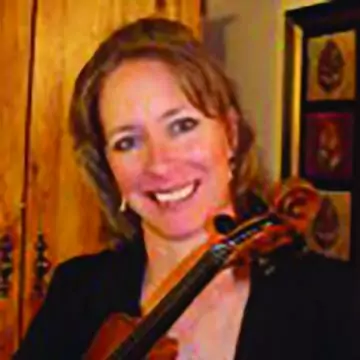My hope is that others can find ways to manage this secondary form of Meniere’s disease, and continue to live happy and productive lives.

Four years ago, I was diagnosed with Endolymphatic Hydrops (Secondary Meniere’s Disease.) The journey to this diagnosis was frustrating, confusing and depressing. Although this diagnosis came as a relief to me in the fact that I do not have vertigo symptoms as many other Vestibular patients do, the diagnosis was, at the same time, potentially debilitating for me. I am a classical violinist and teacher. I depend on my ears as my main tool in playing and teaching.
At the height of my symptoms, I was considering giving up teaching and playing the violin, because it was excruciating to hear the sound of my own instrument. I have been a musician all of my life, and the thought of losing my job and passion after so many years nearly set me on a path to depression. The good news is, with treatment and life style changes, I continue to teach and play. My purpose in writing about my journey is to help others who may be experiencing very life altering symptoms. Although the symptoms associated with Endolymphatic Hydrops do not include vertigo, they can create constant pain in the ear that does not go away, isolation and depression. For musicians and others that rely heavily on the ear, the diagnosis can potentially be career ending.
I was misdiagnosed twice before finding a doctor that could diagnose me. If doctors are telling you that these symptoms will “go away”, with less stress or on their own, search for a doctor that understands the inner ear. The problem does not lie in the middle or outer ear. The outer and inner ear can look perfectly healthy to a doctor. The problem lies deep within. An imbalance in sodium and potassium layers in the inner ear causes the endolymphatic sac to bulge, thus pressing on the cochlear nerve to the brain.
Symptoms
Keep in mind that the presentation of symptoms can vary from person to person. For me, this is how the disease presented itself:
* Sudden feeling of fullness in one ear.
* Sudden hearing loss of low-frequencies in one ear.
* Sudden aversion to loud noises in one ear.
* Distortion in affected ear.
* Hearing “double”. I knew something was terribly wrong when I started to hear two pitches (the fundamental and the overtone) to each note I played on the violin.Hearing constant extra sounds that shouldn’t be there, especially in conversation and listening to music.
* Pain in one ear that does not go away, despite taking pain relievers.
* Agitation from feeling no relief.
* Loss of sleep
* Ringing in the ear constantly
* Isolation: avoiding eating out in restaurants or being around crowds.
* Not able to listen to music or TV without becoming agitated.
* Playing a musical instrument hurts your ear and you hear distorted sounds in affected ear that shouldn’t be there.
Everyday sounds in the environment suddenly bother you.
My Treatment
Again, keep in mind that this is what has worked for me in treatment. It’s worth asking a competent inner ear doctor if some of these approaches may help, but make sure your doctor is ok with trying them! Flare ups can occur, but generally doing these things help keep my symptoms at bay.
* A brain MRI to rule out other disorders
* Keeping a strict, consistent low-sodium diet as outlined by the American Heart Association. This helps relieve the pressing of the nerve to the brain. Spiking your sodium and cheating on one fabulous meal can cause a flare-up. For ideas on how to make a transition to a low sodium diet and love it, see tips I wrote on the Vestibular Disorders website. The silver lining to this diet is that it will make your heart healthier, too.
* Steroids and water pills to relieve inflammation in the inner ear.
* Niacin to help the circulation of the nerve.
* Allergy shots (Although doctors do not know what causes Endolymphatic Hydrops, one theory is that allergies contribute to the disease.)
* Reduce stress, as this causes inflammation.
* Regular hearing tests: Low-frequency hearing loss can be remedied if you are diligent in your treatment.
* Use of a specially fitted musician’s earplug to help with decibel level in the affected ear.
Although this disease is unpredictable, I have been blessed to discover treatment that works. My hope is that others can find ways to manage this secondary form of Meniere’s disease, and continue to live happy and productive lives.